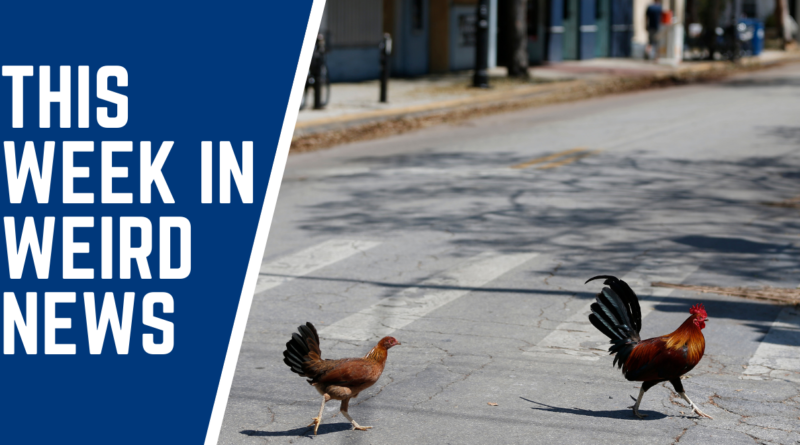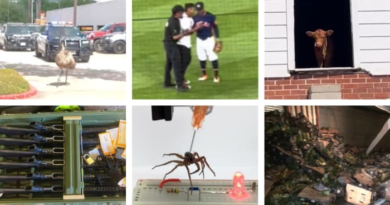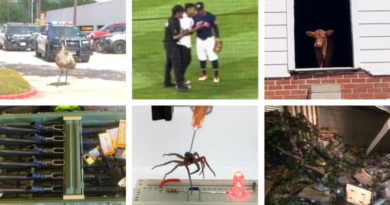This week in weird news: Key West wants to ban people from feeding roaming chickens – Kenosha News
Get local news delivered to your inbox!
“They’re being fed and when you ask anybody to stop it’s like you’re asking them for their first-born. It’s a heated thing on both sides.”
A Humvee, valued at $120,000, was recovered early Wednesday morning after it was stolen from a military facility on last week, according to officials.
The military vehicle was found in the southeast part of Los Angeles, according to a tweet from the FBI in Los Angeles. It was stolen from the National Guard Armory in Bell, California, around 8:15 a.m. local time Friday morning, according to the FBI.
A Humvee stolen from a military facility in Bell, California, was recovered Wednesday.
The four-door, green camouflage Humvee has been upgraded and is considered a combat vehicle. The FBI released images of the vehicle on Friday, seeking the public’s help in locating it.
A photo provided by the FBI on Wednesday shows the vehicle in the location where it was recovered this morning. It is unclear whether the Humvee sustained any damage.
The person or group responsible for the theft has not yet been determined and the investigation continues, the FBI said.
Theft from a military facility carries a statutory maximum sentence of 10 years in federal prison, the FBI said.
The FBI also thanked the California Army National Guard, California Highway Patrol and Los Angeles Police Department for their help in recovering the Humvee.
Those exhausted by 2021 — and well, all of 2020 — can get some relief by calling a hotline and screaming. Yes, really.
Just Scream!, a hotline created by elementary school teacher Chris Gollmar, aims to reduce tension for those needing an outlet. All you have to do is call the hotline and scream for as loud as you want, and for as long as you want — and then hang up.
“I wanted to find a prompt that people would respond to and screaming seemed to be a good fit!” Gollmar told CNN of his creative project, which he came up with in September 2020 and launched just before Election Day in November.
Just Scream!, a hotline created by elementary school teacher Chris Gollmar, aims to reduce tension for those needing an outlet.
Gollmar, who said he’s been an artist and coder since he was a kid, spends his free time working on participatory art projects that invite people to call a phone number and leave a voicemail for others to hear.
This time, he said he “thought it would be funny and unique to create a phone line just for screaming.”
After people dial in, their calls are recorded and put on the website Gollmar created.
“Why should I call you?” the website asks.”To scream! You might be unhappy, terrified, frustrated, or elated. All of these are perfectly good reasons to call and record yourself screaming.”
Personal phone numbers are not stored, and all calls go to an answering machine — so interacting with a real person isn’t required.
According to the website, there is currently a backlog of over 40,000 screams waiting to upload.
“Wow! That’s a lot of screaming!” the website states, noting if people can’t hear their own scream that it may still be processing.
Gollmar said he’s gotten 70,000 recordings since launching the hotline.
“Never in my life would I have expected so many people to actually pick up the phone, dial a number and record themselves for the world to hear,” he said. “But we’re all screaming on the inside right now, so I guess I should have figured.”
The hotline will stop accepting calls on January 21. After that, Gollmar said he will pick a new project to work on.
“I’ve always intended it (the hotline) to be a limited-term project — a reflection of this point in time when, in addition to all the stress of the pandemic, we’re also experiencing political turmoil in the United States,” he said. “I’ve started thinking about it like a time capsule, in a way.”
Don’t worry, though: The screams will remain on the project’s website. Happy listening.
Colombia’s best-known drug trafficker, Pablo Escobar, may have been killed in 1993 but his influence continues to be felt in the country, sometimes in unexpected ways.
Hippopotamuses brought to Colombia as part of Escobar’s private zoo at his ranch, Hacienda Napoles, have bred so successfully that there is serious concern over their environmental impact and human safety, according to a new study by researchers at Mexican and Colombian universities.
Escobar brought the hippos to his ranch in the early 1980s.
The hippos have spread out from their original home, some 100 miles east of the city of Medellin, in the Antioquia department, dispersing around the Magdalena river basin as their population continues to grow steadily.
The authors of the study, published in the January edition of the journal Biological Conservation, recommend that the hippos be culled to prevent long-term negative effects, but other scientists are calling for a castration program to control the hippo population, citing concerns over animal welfare and the attachment of some locals to their new neighbors.
Back in the 1980s, Escobar imported one male and three female hippos to join his menagerie. Upon his death, other species of exotic animals were relocated, but the hippos were left because they were difficult to capture and transport, according to the study.
The hippopotamus population has grown steadily and the animals have become a hazard, the study argues.
The hippos soon began to spread in the surrounding area, but government efforts to cull them were halted after a public outcry.
A sterilization campaign was begun instead, but it has done little to slow the hippos’ progress.
From 2011 to 2019 four males were castrated and two females were sterilized, but this “does not seem to have an important impact on reproduction,” according to the study.
Researchers say there are probably more than 80 hippos in the area today, up from 35 in 2012, and they worry that the hippos will continue to spread throughout Colombia if no action is taken.
Some hippos remain at Escobar’s Hacienda Napoles, which is now a theme park.
The study also cites research showing the negative effects of hippo waste on oxygen levels in bodies of water, which can affect fish and ultimately humans, and raises concerns about the possible transmission of diseases from hippos to humans.
Hippos also pose a threat to the livelihoods and security of people in affected areas, the study said, eating or damaging crops and engaging in aggressive interactions with humans.
The researchers cite incidences of hippos chasing people, as well as a hippo attack in May 2020 in which a 45-year-old man was seriously injured.
But while the study’s authors recommend a cull, Enrique Zerda Ordóñez, a biologist at Colombia’s National University, believes castration programs are the way forward.
Culling the hippos would be an “easy option,” said Zerda, but it could affect the survival of a species that is under threat in Africa.
Though sterilizing hippos is no easy task, he said, he believes it is both possible and necessary to do so now, before their numbers rise further, according to a press release from the university.
“Right now, the authorities don’t consider the species to be a problem,” Zerda said, “but in the future, when there are 400-500 hippos, it could represent a threat to the survival of other species that feed in the same areas.”
David Echeverri Lopez, head of forests and biodiversity at the CORNARE regional environmental agency, told CNN that the situation is delicate.
“The option of killing them has always been on the table,” he said. “However it’s very difficult to imagine this could happen at the moment.”
While the hippos are an invasive species capable of completely changing local ecosystems, people in the area have gotten used to them, Echeverri said. They’ve become a tourist attraction that people feel some affection toward, he added.
Some of the hippos will have to be killed, because it’s “practically impossible” to find and relocate or sterilize them.
“But there are some other animals that are located in certain areas, in lakes and places that allow for a birth control plan to be put in place, assuming that adequate resources are available,” said Echeverri, who is working with the NGO Animal Balance to try to find alternative solutions.
A man was stopped at the Vienna airport as he tried to smuggle 74 chameleons from Africa. They were hidden in socks and empty ice cream boxes.
Get up-to-the-minute news sent straight to your device.



